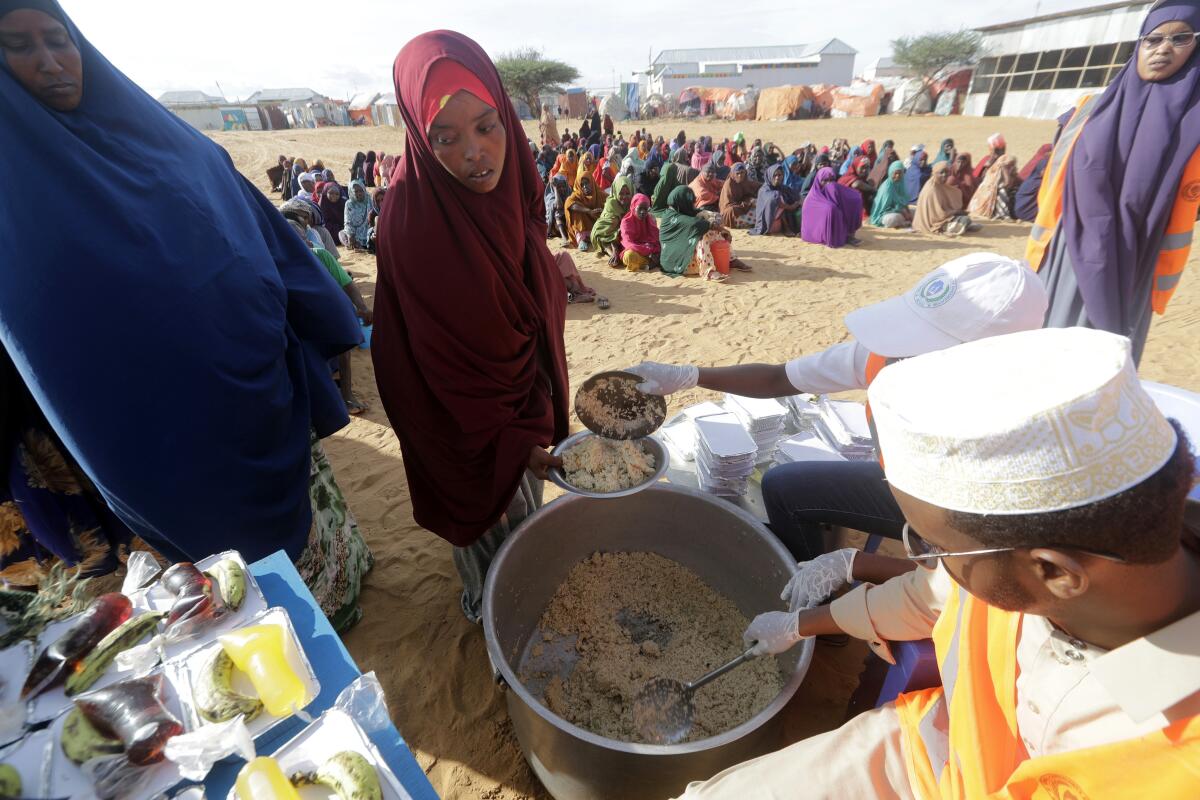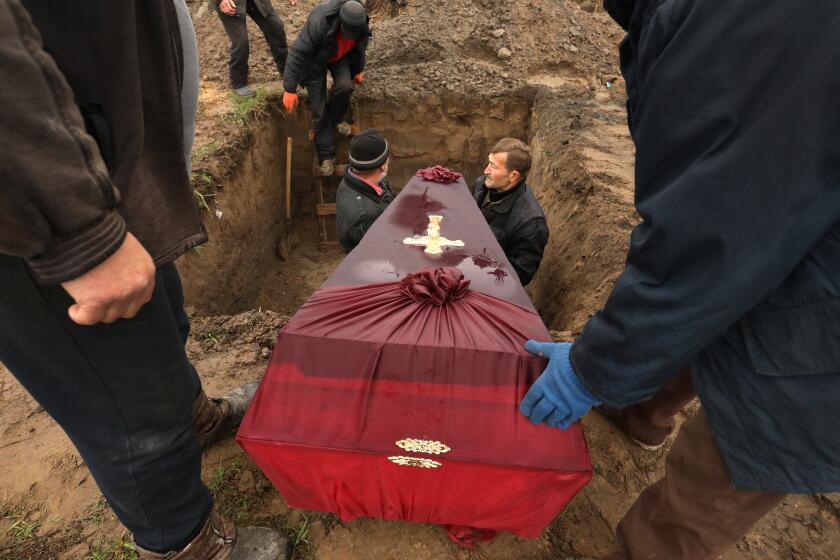In drought-plagued Somalia, some break the Ramadan fast with little but water

- Share via
MOGADISHU, Somalia — The holy month of Ramadan this year coincides with the longest drought on record in Somalia. As the sun sets and Muslims around the world gather to break their daily fasts with generous dinners, Hadiiq Abdulle Mohamed and her family have just water and whatever food might be at hand.
Mohamed is among more than 1 million Somalis who have fled their homes in search of help as an estimated 43,000 people died last year alone. She, her husband and their six children have taken refuge in one of the growing displacement camps around the capital, Mogadishu.
Ramadan brought an increase in food prices for a country already struggling with inflation caused in part by Russia’s invasion of Ukraine and the withering of local crops by five consecutive failed rainy seasons. Millions of farm animals that are central to people’s diets have died.
Food is even harder to come by for those displaced. During Ramadan, Mohamed and her family rely on well-wishers to provide their single meal each day. They break their fasts first with water and pieces of dates, then spoonfuls of rice. Finally, they eat the donated meal of rice cooked with mixed meats, bruised banana and a small plastic bag of juice, for which Mohamed waits in line for hours under the searing sun.
“I recall the Ramadan fast we had in the past when we were enjoying and prospering. We would milk our goats, cook the ugali [maize porridge] and collard greens and drink water from our catchment,” she said. “This year, we are living in a camp, without plastic to cover us from rain, without food to eat, thirsty and experiencing drought. We have this small hot meal, but do you think that this can feed a family of six children, plus a mother and father?”
The typical Ramadan fast-breaking meal includes samosas and other snacks; juice, tea and coffee; a main dish of rice, spaghetti or flatbread with camel, goat, chicken or fish; and dessert.
Mohamed’s family once was prosperous and owned farmland and goats in a village about 90 miles west of the capital. Now they try to get by on the little money her husband makes by carrying goods in a wheelbarrow. But food prices have soared so much that his income is no longer enough to buy a 2.2-pound bag of rice.
Russian atrocities number in the tens of thousands, Ukraine says. The ICC wants to arrest Putin. But what are the prospects for justice?
The inflation in Somalia pinches those who are better off too. The country imports the majority of its food, including Ukraine-grown wheat and bottles of Mountain Dew stocked in Mogadishu shops. Meanwhile, prices of basics like rice and cooking oil continue to rise in parts of the country.
This month, World Food Program monitoring reported that supply chain resilience was generally good in Somalia, but the spike in demand for Ramadan would be “a disadvantage to vulnerable households who depend on local markets.”
“We are really experiencing a soaring price of food and other basic commodities,” said Ahmed Khadar Abdi Jama, a lecturer in economics at Somalia University. “Whenever there is an external factor that can reduce the supply of food, such as the Russia-Ukraine conflict, it is more likely that Somalis will feel a low supply.”
For example, a kilogram of camel meat that cost about $4 before the holy month now costs about $6. The inflation will subside when the month is over, Khadar said.
Ramadan is a month of alms and forgiveness throughout the Muslim world. With the growing number of Somalis displaced by drought, the imams of the mosques in Mogadishu are leading efforts to encourage the city’s wealthy and others who can afford it to sympathize with the poor and give generously.
“Some people need food to afford to break their fast,” said one imam, Sheikh Abdikarim Isse Ali. “Please help them.”
More to Read
Sign up for Essential California
The most important California stories and recommendations in your inbox every morning.
You may occasionally receive promotional content from the Los Angeles Times.














